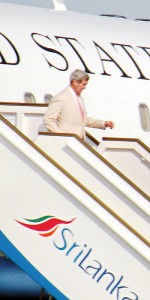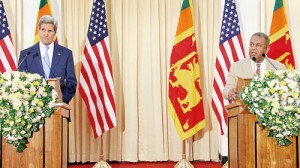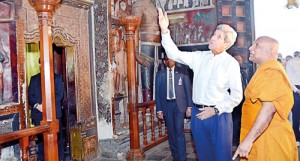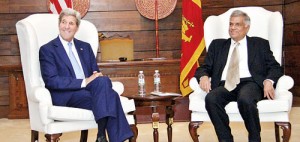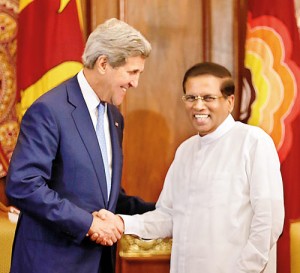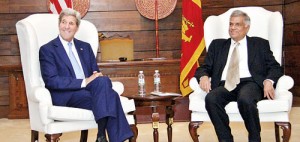News
Sri Lanka’s problems for Sri Lankans to solve, we will only help: Kerry
View(s):US Secretary of State John Kerry addressed a public lecture yesterday at Colombo’s Taj Samudra Hotel. The public lecture was organised by the Lakshman Kadirgamar Institute for International Relations and Strategic Studies. Minister of Foreign Affairs Mangala Samaraweera made the welcome address.
Excerpts of Mr. Kerry’s speech:
I’m really happy to be here.’Ayubowan’ and ‘Vanakkam’. I am very happy to welcome all of you here. No you are welcoming me. That is mutual welcome. I thank (Foreign Minister) Mangala (Samaraweera) and Sri Lanka now for the very generous welcome you gave me this morning when I first came here and came over to that historic building that is now Foreign Ministry. Thank you for that my friend!
I also wanted to thank you for your remarkable efforts — yours, the President’s, the Prime Minister’s — on the behalf of the people of Sri Lanka and I thank you for something else.
I also want to say thank you to all of you who have come here — students and educators, civil society, activists, religious leaders and everyone from the government: The diplomatic community and the private sector who has committed time to be here to share some advice this afternoon. It is really fitting we are gathering under the auspices of the Lakshman Kadirgamar Institute.
Lakshman was, to put it simply, a brave man and a good man. He rejected recrimination in favor of reconciliation. He knew that the future demanded that his country move beyond the more difficult chapters of its past. And he devoted his last years to healing Sri Lanka and to leading it to its rightful place within the community of nations. He said wisely, “We have to live in Sri Lanka as Sri Lankans, tolerating all races and religions.”
So many of you here are the fathers and mothers of this vision. But as any parent will tell you, your obligations don’t end with the child’s birth. They are just beginning. Sri Lanka’s new found civil peace has to be nurtured. It has to be allowed to grow and become stronger until it is in fact fully mature.
If Lakshman Kadirgamar was here and he had lived to see this new era, I know he would be inspired by the people of this country – Sinhalese and Tamil, Buddhist, Hindu, Christian, and Muslim. He would see the possibilities of a Sri Lanka reconciled, democratic, and prosperous, with a united and entrepreneurial people dedicated to making their country a shining jewel of the Indian Ocean and of the broader Indo-Pacific.
The United States, I am here to tell you, believes in that vision. We believe in the potential of Sri Lanka, the potential of Sri Lanka’s people – and I mean all of its people. And I can assure you that the United States, that America will stand with you by your side as you build a stronger democracy and a future that is marked by peace and prosperity after so many years of suffering and hardship.
I don’t have to tell you that history. You know it. You live it. You experienced it for thirty years, terrorism, sectarian violence, suffering, death, anger, disappearances, moment of hopes, followed by more loss, more hate, more fear. Having gone to war myself, as Mangala mentioned, not very far from here, I know the tragic truth that in peacetime, children bury their parents, but in wartime, parents bury their children. Sri Lanka has known too many generations of parents forced to bury children.
Let me be very clear about this: It is sometimes necessary to go to war, despite the pain it brings. For all of my country’s disagreements with the previous government in Sri Lanka over how it fought the LTTE, we clearly understood the necessity of ridding this country of a murderous terrorist group and the fear that it sowed.
I believe that you learned in the final, bloody days of that struggle what my country discovered to our own anguish during our civil war: There were no true victors – only victims. You saw, I trust, that it is obvious the value of ending wars in a way that builds a foundation for the peace to follow.
I know you recognise today that the true peace is more than the absence of war. True and lasting peace, especially after a civil conflict, requires policies that foster reconciliation, not resentment. It demands that all citizens of the nation be treated with equal respect and equal rights, and that no one be made to feel excluded or subjugated. It calls for a military that projects its power outward to protect its people, not inward to police them.
It necessitates, as America’s great president Abraham Lincoln said, binding up the nation’s wounds, with malice towards none and with charity towards all.
Today, there are young people in this country who are experiencing peace for the first time in their lives. We need to hope, we need to make certain that they will know anything – that they will never know anything except for peace.
And that isn’t easy – recovering from conflict, believe me, never is easy. Under President Sirisena’s leadership, Sri Lanka’s traditions of critical debate, free press, and independent civil society are returning. The armed forces have started to give back land to people in the north. Your citizens have been asked to mourn all the dead – not just those from one part of the country or one ethnicity or one faith. Incidents of violence have decreased.
The government has stood up against hate speech and created a presidential task force on reconciliation led by former President Kumaratunga. And just this week, parliament passed and the president championed, as Mangala said, a constitutional amendment that actually limits the powers of his office. Promise made; promise kept.
Now, the problems of Sri Lanka are clearly going to be solved by Sri Lankans. That’s the way it ought to be, but it’s also the only way it’s going to work. And you wouldn’t have it any other way.
But if – but we also know that, in today’s world, everyone and everything is connected. And when we are connected unlike any time in history – everybody’s walking around, even in places where they’re poor, with a smartphone and a cellphone; they’re in touch, they’re in touch with the world. So if there are steps the United States can take to help, we will do so. I know you have your own plan and your own notions about what is necessary, and by no means whatsoever do we intend to try to usurp that or evade that or dismiss that. That would be inappropriate and unwise at the same time. But we do have some suggestions, as friends. And let’s offer four possible areas for cooperation.
First. Reconciliation. The majority of you voted for a Government that is committed to the difficult task of healing: The difficult task of literally healing the wounds of war. But that is a difficult job with many components.
Years ago, I want you to know that when I was a member of the United States Senate – in the early years in the ‘90s, Mangala– I was put in charge of an investigation to try to determine the fate of American soldiers, sailors, and aviators who were still missing from the Vietnam War during the 1960s and the 1970s. The families of those in America whose loved ones had been lost were desperately trying to get answers from the government and demanding answers, and they had every right to do so. And we knew that it was impossible for us to try to move forward if we didn’t try to provide those answers. So we did everything possible that there was to try to find out what happened to their loved ones. I travelled to Vietnam something like 17 or 20 times in the span of two years, working with the Vietnamese to let us into their history houses, to their museums, to their documents – even to interview with the generals that we had fought against to see if we could provide those answers.
So we experienced the same emotions and the same search for answers that are present in your country today. And that is why it is so critical for your government to work with the ICRC and the UN in order to investigate missing person cases and try wherever you can – I can’t guarantee it; nobody can that you’ll find the answer for sure – but try to find wherever the truth may lead. No matter how painful that truth is. It’s the right and the humane thing to do – and it is, believe it or not, an essential part of the healing process.
Now, reconciliation obviously doesn’t happen all at once; it requires time and concrete actions. And those have to replace the suspicion with mutual trust and mutual fears have to be replaced with mutual confidence. I want you to know that the United States stands ready to be a partner with you in that effort.
We’ll do all we can to support the government as it makes progress in such areas as returning land, limiting the role of the military in civilian life, and trying to provide the answers on disappeared people. None of us wants to live in a country where the military is stopping its own citizens at checkpoints. And Sri Lanka’s military has so much more to contribute in defending this country, protecting vital sea lanes, and taking part in UN peacekeeping missions all over the world. And as your armed forces make that transition, we’re going to be very eager to work with you and to work with them and to help.
That said, the job of bringing Sri Lankans together also cannot be done by the government alone. So it matters what you say, it matters what people say, and that they have the right to say it. It matters what civil society – that many of you here represent – what you have to say. It matters what religious groups are saying and what they’re able to accomplish, and that they have the freedom to be able to move to do so. And it matters what communities are able to do in order to fix the kind of social problems that impact everyone – from promoting health care and a clean environment to countering domestic violence and drug use – and that the central government trusts people to take the lead.
Now in all this – some may think this goes without saying, but in too many parts of the world it doesn’t – the women of Sri Lanka are playing a critical role, and must. They are helping the needy and the displaced. They’re encouraging people to build secure and prosperous neighborhoods. They are supporting ex-combatants and survivors of sexual and gender-based violence, and they’re providing counseling and other social services. And these efforts are absolutely vital and we should all support them.
But we also have to do more than that. Here, as in every country, it’s crystal clear that for any society to thrive, women have to be in full control – they have to be full participants in the economics and in the political life. There is no excuse in the 21st century for discrimination or violence against women. Not now, and not ever.
that brings me to the second area of possible cooperation on justice and accountability. Restoring your country’s judiciary is a long-term undertaking that requires high standards for judicial independence, fairness, and due process under the law. Those reforms are often difficult to achieve anyway – we’re still working on some things in our system, believe me; you can see some of it on television – not easy, but it is absolutely essential to be open and honest about trying to do it. Every citizen has a right to seek justice, and every citizen has a right to expect justice for victims of war crimes or crimes against humanity. They’re painful issues; I know that. But if you try to compel people to simply forget the past and try to wipe it away, believe me: They will be more likely, not less, to cling to it. And if you tell them to forego justice under the law, they will be more likely to seek it outside of the law. It will be harder, not easier, to move forward as one country at peace.
That is why we hope your government will continue to cooperate with the United Nations as it explores the best way to mount a credible domestic investigation into allegations of human rights abuses – an investigation that meets international standards and at the same time, and most importantly, is legitimate in your eyes, in the eyes of the people here. The United States is prepared to furnish whatever legal, whatever technical assistance, whatever help we can to support Sri Lanka as it moves down this path.
A third area where we can work together is the advancement of human rights, here and around the world. The new government that you’ve elected is laser focused on establishing a strong reputation for your country on human rights. And the United States could not be more supportive of that goal. Until just recently, our diplomats routinely clashed with yours on these issues at the Human Rights Council in Geneva and the UN in New York. Now, with the new government, with the turning of this critical page, we have an opportunity to work together. But we also continue to urge your government to release remaining political prisoners, and we would be pleased to assist in those efforts by sending a team of legal experts to advise on assessment and release, which is a critical component of the documents that have to be made in that.
And I say this fully mindful of the fact – believe me – no nation, including the United States, has a perfect record on human rights. We all have to do our best in order to improve. And I hope that the momentum that has been created in Sri Lanka will continue to build, and I’m confident that with the government you have and their commitments reiterated to me today, I have no doubt that you will.
a final challenge on which our two governments may be able to work together is the strengthening of democratic institutions. Here, you have a very strong foundation on which to build. Your former president reminded me that they had lunch, that you had the first – the longest serving supreme court in all of Asia, and that you have one of the oldest parliaments. You have this extraordinary foundation on which to build. We simply offer our support to help you in any way that we can on this effort of capacity building and the challenge of restoring the tradition that you have always had with respect to the fullness of your democracy. We want to help support you in the upcoming electoral processes. Timely elections will be yet another sign of the government following through on its commitments.
The people of Sri Lanka deserve great credit for the recent elections. And I want to congratulate all of you. They’re quite remarkable. You turned out in huge numbers to exercise your rights. Every vote was a victory for your country. And you insisted on historic reforms, including a constitutional amendment that was just restoring the independence of the electoral commission. But hard work remains, my friends, including devolving power to the provinces. The United States stands ready to provide technical assistance to make it easier to implement these measures and to strengthen such critical institutions as the ministries and parliament. We’re also ready to help with asset recovery and the enforcement of anti-corruption rules. Our investigators are prepared to work with your investigators. Our prosecutors are prepared to work with your prosecutors. And we commit that any stolen assets in the United States will be returned to their rightful owners.
We’ve seen in recent decades that free countries can learn from one another, and that, to prosper, they have to be prepared to help one another. And that is why I’m pleased to announce that our governments will launch a partnership dialogue to intensify our cooperation across the board. President Obama has nominated a new ambassador, and as a symbol of our renewed commitment to this relationship, I am happy to announce that we are going to build a new embassy compound. And our partnership dialogue and expanded bilateral assistance will help consolidate Sri Lanka’s very impressive gains. We also want to do this in a spirit of friendship and mutual respect. We’re not doing this as part of any global countering or whatever – make your choices. That’s your right as independent people. But we appreciate and respect and admire the steps that have been taken by you to give yourself a government that wants to restore that government. And in any way that we can help, we stand ready to do so.
So to sum up, Sri Lanka is at a pivotal point. Peace has come, but true reconciliation will take time. Your institutions of governance are regaining strength, but further progress will have to be made. The United States will help when and where we can. And no part of this transition, obviously, will be easy, but if Sri Lanka keeps moving forward, I have every confidence it will take its rightful place of respect and of influence on the world stage.
For the full text of the speech, visit http://www.state.gov/secretary/remarks/2015/05/241421.htm
The visiting US Secretary of State John Kerry called on President Maithripala Sirisena and Prime Minister Ranil Wickremesinghe soon after his arrival. He also met with Foreign Minister Mangala Samaraweera where both of them made statements to the media.
Kerry also visited the Kelaniya Rajamaha Vihara before addressing a public lecture organised under the auspices of the Lakshman Kadirgamar Institute for International Relations and Strategic Studies.
Mr. Kerry addressed the media later in the day. Pictures from the events attended by Mr. Kerry.
Pix by Indika Handuwala and Nissanka Meegoda, Kumarasiri Prasad and and Sudath Silva
